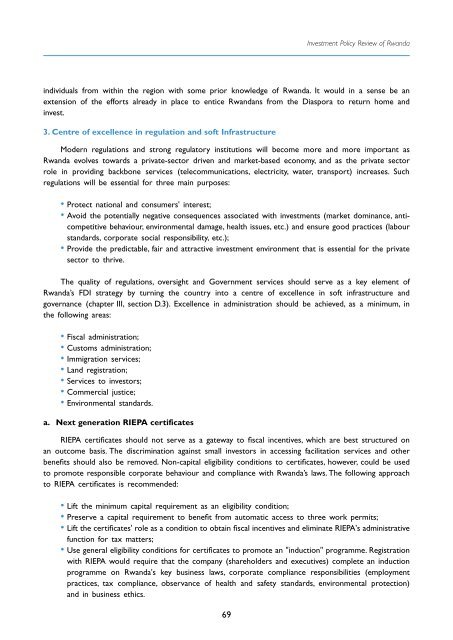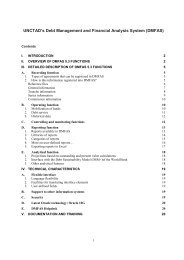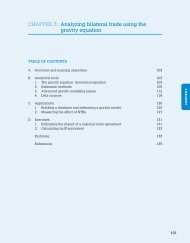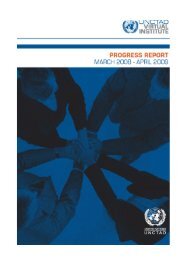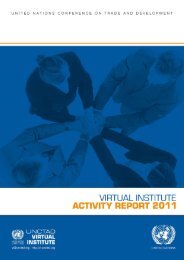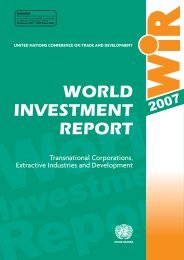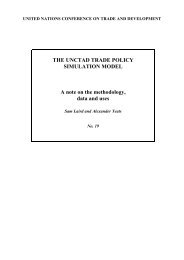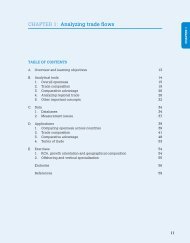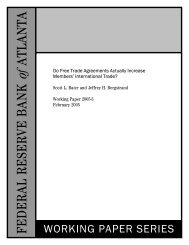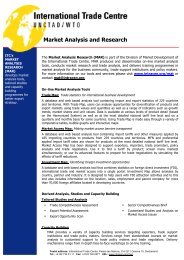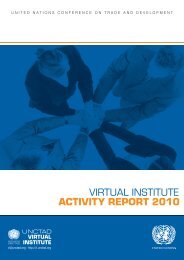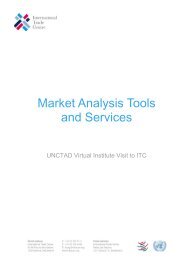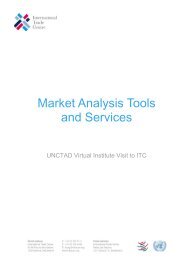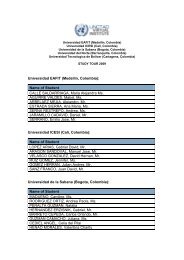Investment Policy Review - Rwanda - UNCTAD Virtual Institute
Investment Policy Review - Rwanda - UNCTAD Virtual Institute
Investment Policy Review - Rwanda - UNCTAD Virtual Institute
Create successful ePaper yourself
Turn your PDF publications into a flip-book with our unique Google optimized e-Paper software.
<strong>Investment</strong> <strong>Policy</strong> <strong>Review</strong> of <strong>Rwanda</strong><br />
individuals from within the region with some prior knowledge of <strong>Rwanda</strong>. It would in a sense be an<br />
extension of the efforts already in place to entice <strong>Rwanda</strong>ns from the Diaspora to return home and<br />
invest.<br />
3. Centre of excellence in regulation and soft Infrastructure<br />
Modern regulations and strong regulatory institutions will become more and more important as<br />
<strong>Rwanda</strong> evolves towards a private-sector driven and market-based economy, and as the private sector<br />
role in providing backbone services (telecommunications, electricity, water, transport) increases. Such<br />
regulations will be essential for three main purposes:<br />
•<br />
•<br />
Protect national and consumers' interest;<br />
Avoid the potentially negative consequences associated with investments (market dominance, anticompetitive<br />
behaviour, environmental damage, health issues, etc.) and ensure good practices (labour<br />
standards, corporate social responsibility, etc.);<br />
Provide the predictable, fair and attractive investment environment that is essential for the private<br />
sector to thrive.<br />
•<br />
The quality of regulations, oversight and Government services should serve as a key element of<br />
<strong>Rwanda</strong>’s FDI strategy by turning the country into a centre of excellence in soft infrastructure and<br />
governance (chapter III, section D.3). Excellence in administration should be achieved, as a minimum, in<br />
the following areas:<br />
•<br />
•<br />
•<br />
•<br />
•<br />
•<br />
•<br />
Fiscal administration;<br />
Customs administration;<br />
Immigration services;<br />
Land registration;<br />
Services to investors;<br />
Commercial justice;<br />
Environmental standards.<br />
a. Next generation RIEPA certificates<br />
RIEPA certificates should not serve as a gateway to fiscal incentives, which are best structured on<br />
an outcome basis. The discrimination against small investors in accessing facilitation services and other<br />
benefits should also be removed. Non-capital eligibility conditions to certificates, however, could be used<br />
to promote responsible corporate behaviour and compliance with <strong>Rwanda</strong>’s laws. The following approach<br />
to RIEPA certificates is recommended:<br />
•<br />
•<br />
•<br />
Lift the minimum capital requirement as an eligibility condition;<br />
Preserve a capital requirement to benefit from automatic access to three work permits;<br />
Lift the certificates' role as a condition to obtain fiscal incentives and eliminate RIEPA's administrative<br />
function for tax matters;<br />
Use general eligibility conditions for certificates to promote an "induction" programme. Registration<br />
with RIEPA would require that the company (shareholders and executives) complete an induction<br />
programme on <strong>Rwanda</strong>'s key business laws, corporate compliance responsibilities (employment<br />
practices, tax compliance, observance of health and safety standards, environmental protection)<br />
and in business ethics.<br />
•<br />
69


